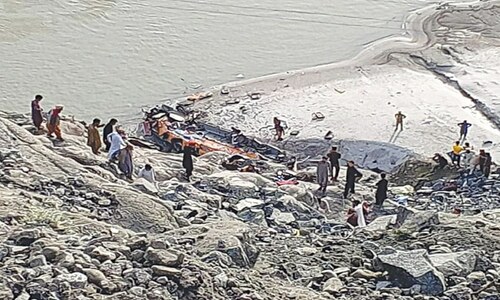• Punjab reports its first case
• 13 returning from Iran found with virus in Sukkur
• Two patients in critical condition
ISLAMABAD: In the highest single-day jump in the number of cases, 22 new cases of the novel coronavirus (COVID-19) were confirmed in different parts of the country on Sunday, raising the nationwide tally to 52.
Punjab reported its first case and the patient has been admitted to Mayo Hospital.
In the federal capital, a second case has been confirmed as the husband of the 30 years old woman, who was confirmed with virus on Saturday, has also become victim of the deadly virus.
As many as 18 more cases of coronavirus have been reported in Sindh. Of them 13 patients are pilgrims returning from Iran who have been kept in quarantine in Sukkur. One of the patients came from Quetta. The number of cases has reached 35 in Sindh.
This was disclosed in the 18th meeting of the Task Force on Coronavirus held under the chairmanship of Sindh Chief Minister Syed Murad Ali Shah at the CM House in Karachi.
Media Coordinator of the Pakistan Institute of Medical Sciences (Pims), Dr Wasim Khawaja, told Dawn that the husband of a female patient, who had came to Islamabad to attend a marriage ceremony from abroad, had tested positive for the virus.
“The woman is still in critical condition and on ventilator. Moreover, a suspected patient, who has been shifted from Sargodha, is also in critical condition and has been put on ventilator,” he said.
Replying to a question, Dr Khawaja said four patients had been admitted to the hospital.
He said as the Islamabad couple was infected with the virus, their entire family, including bridegroom and bride, had been put in quarantine at their residence.
“They will stay at their home for 14 days which is the incubation period of the virus,” he said.
The Punjab Health Department confirmed the first case of coronavirus in the province.
The 54-year-old patient was hospitalised in the early hours of Sunday morning after developing COVI-19 symptoms. He had returned from the UK on March 10.
Sources in the health department said the authorities were alerted about the patient by a private laboratory where he had been brought by the family for test that resulted in positive.
They said the family took the patient back home but was traced with the help of the data submitted with the lab. The patient refused to be shifted to the hospital during late night arrival of a health team at his Defence Housing Authority residence, the sources said, adding that he was taken to Mayo Hospital at 4am after much persuasion.
Punjab Health Secretary Mohammad Usman said the patient, who had gone abroad on March 1 and returned on 10 via Dubai, was retested at Mayo Hospital for re-confirming the disease.
He said the patient, who is improving at the health facility, had remained confined to his house. The patient went neither to any market nor did he meet anyone other than his immediate family members and domestic help.
The family and the maids, all totalling 10, had tested negative for the virus but as a precautionary measure had been quarantined in their house under surveillance disallowing any person to visit them during the two-week mandatory isolation period, he added.
The secretary said those in quarantine would be tested against for COVID-19 at the end of the mandatory period.
He said the family had refused to reveal if the patient had gone to any restaurant during the past 10 days.
Asked if attempts were being made to locate and test the passengers and the crew of the flight the patient had travelled on, the health secretary said his department had written to the Federal Investigation Agency to provide details of the passengers who travelled with the patient on the same flight. He said teams would be sent to their locations after getting details from the FIA so that they could be screened for the virus.
These passengers and the crew may be possible carriers of the virus for touching the aeroplane’s seats, handles, luggage compartment the patient had also touched.

Worries over Taftan
General Secretary of the Pakistan Medical Association Dr Qaisar Sajjad, while talking to Dawn, said he was worried about the situation at Pakistan-Iran border at Taftan, Balochistan, where a large number of Pakistanis returning from Iran have been kept in quarantine.
“We are getting pictures and videos depicting that a large number of people have been kept in unhygienic conditions at Taftan due to which human-to-human transmission of the virus can start there. After keeping the people at Taftan, they are sent to their provinces where they are kept in quarantine again and there also the virus can spread easily. I suggest that the government should come up with a strategy otherwise the situation may deteriorate,” Dr Sajjad said.
He said a prominent personality had told him that his mother-in-law was also stuck at Taftan. “Those people don’t have proper toilets and are living in miserable condition. Such a situation decreases the immunity level of people and they can become prey of the virus easily,” he said.
Dr Sajjad warned that if human to human transmission of disease started in Pakistan, no one would be able to control the disease and the chance of a large number of casualties could not be ruled out.
“There are very pathetic conditions at Taftan in terms of hygiene and sanitation which may lead to spread of other diseases too,” he said and asked. “Who is responsible for meeting the World Health Organisation’s guidelines?”
Executive Director of the National Institute of Health Maj Gen Dr Aamer Ikram confirmed that 52 cases of COVID-19 had been reported from different parts of the country so far.
“We have been holding meetings on daily basis to deal with the issue... Unfortunately the issue of Taftan border has become troublesome. I had a hunch that cases can be reported among the pilgrims coming from Iran, as situation in Iran was terrible and we could not get timely information about it,” he said.
However, Special Assistant to the Prime Minister on Health Dr Zafar Mirza said there was no need to panic as the government was determined to take all possible steps to control the disease.
The outbreak of COVID-19 was first reported from Wuhan, China, on Dec 13, 2019, and later the disease spread in other counters. So far 162,700 cases have been reported in over 150 countries. As many as 6,069 deaths have been reported and 76,219 patients have recovered.
In Pakistan two patients have recovered and discharged from hospital.
According to information available at the website of NIH, the novel coronavirus is a new strain of coronavirus that has not been previously identified. Public health officials and partners are working hard to identify the source of the virus. Coronaviruses are a large family of viruses, some causing illness in people and others that circulate among animals, including camels, cats and bats.
Amjad Mahmood from Lahore and Tahir Siddiqui from Karachi also contributed to this story
Published in Dawn, March 16th, 2020















































Dear visitor, the comments section is undergoing an overhaul and will return soon.